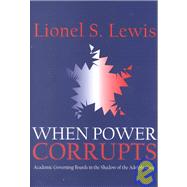When Power Corrupts: Academic Governing Boards in the Shadow of the Adelphi Case
, by Lewis,Lionel S.- ISBN: 9780765800312 | 0765800314
- Cover: Hardcover
- Copyright: 4/30/2000
It is often said that the American academic, protected by tenure, is free to do pretty much as he or she pleases. Lewis argues that this freedom is largely an illusion. Faculty actions are greatly limited by governing boards and the academic administrators they appoint, who control institutional resources. Although ostensibly independent professionals, in many ways faculty have no more autonomy than most employees. Indeed, what power they have derives from faculty-student relationships. Lay governing boards ultimately control how money is spent and who spends it. This volume addresses issues relating to current debates over the most appropriate and effective method of academic governance.When Power Corrupts details the conflict between the governing board and administration and faculty at Adelphi University in Garden City, New York, between 1985 and 1996. This conflict culminated in the removal of the Board of Trustees by the New York State Board of Regents. The new trustees in turn removed the president. Although the book focuses on board administration-faculty relations at one university, its findings have implications for almost all other institutions of higher learning in the United States. Lewis draws on the nearly 8,000-page transcript of the hearings of the Regents. These eleven volumes of exhibits include hundreds of documents obtained from individuals and organizations.Lewis suggests that academic administrators have more control of governing boards than is generally recognized. Besides influencing who is asked to join a board, administrators may largely determine the information boards receive and on which they must make decisions. When faced with decisions, boards oftendefer to academic administrators or acquiesce to a campus president's suggestions. Because conflict over governance all too often takes precedence over academic work on American campuses, the implications for higher learnin







